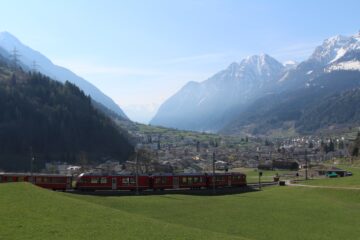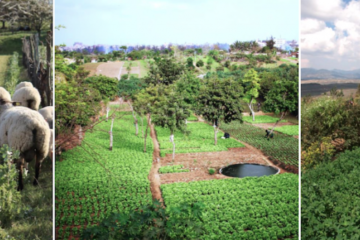The International Mountain Conference took place on October 19, 2023, in Saignelégier, Switzerland. The conference brought together 197 participants in-person (74%) and virtually (26%) from 38 different countries across Europe, America, Africa, and Asia. Among the participants, 50% were from the academic field, and the rest were mainly from research institutions, public institutions, and associations. The debate focused on climate change and the adaptability of food chains in the particular context of mountain areas.
In the morning, group visits took place in the Jura region and neighboring France. The first group visited two cheese factories: the Fromagerie des Franches Montagnes (Noirmont) and the fruitière de Charmauvilliers in France. The group discussed the adaptation strategies of producers to the consequences of climate change. The second group explored institutions leading projects to respond to the challenges of mountain territories: INTERREG of the Fondation Rurale Interjurassienne (FRI), and the Chambre d’Agriculture du Doubs et Territoires de Belfort, and the Sustainable Agricultural Production Systems (SPAD) project. The third group visited two organic dairy farms that have a OneHealth approach to their production. The fourth group visited the Agrocentre de Courtételle, a local initiative, and then went to the Fondation Rurale Interjurassienne (FRI) for a presentation of projects supporting the local sector. The fifth group visited a farm belonging to the Terres Vivantes project and then the Fondation Rurale Interjurassienne (FRI).
The key points of the conference include that mountain regions face major challenges that weaken their food systems: marginalization, poverty, and inequality, natural risks related to climate change, and food insecurity. It is essential to strengthen territorial governance mechanisms that support sustainable initiatives and practices, implement agricultural techniques allowing synergy and greater valuation of resources, and promote local sectors that value local products.
In the Jura region, drought and risks related to climate change have an impact on production costs and farm organization. More sustainable agricultural models are possible if one considers not only the economic dimension but also new technologies, farmers’ health, and work transmission, and if parallel sectors such as tourism are taken into account.
Agriculture and tourism must respect the identity of territories and their inhabitants. Tourism must associate local activities and the traditional landscape to support and promote it. Farmers are open to tourism through which the commercialization sector is mobilized to promote and value mountain agriculture and the experiences it can offer.
Initiatives aimed at promoting mountain gastronomic heritage are multiplying, such as the example of the 100% Valposchiavo certification, which claims 100% organic production in its territory. This brand attracts a large number of tourists looking for high-quality products and authentic cultural experiences.
In the next report (in French), we will provide a more detailed analysis of the key themes and issues discussed at the International Mountain Conference, including the challenges faced by mountain regions, the role of sustainable agriculture and tourism, and the promotion of local sectors and cultural experiences.
 Loading…
Loading…


